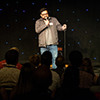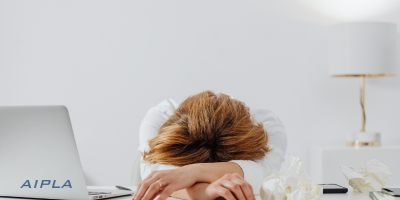Quarterly Journal 45-4
In This Section
The AIPLA Quarterly Journal, a publication of the American Intellectual Property Law Association, is housed at the George Washington University Law School and is edited and managed by an Editorial Board of intellectual property experts and a staff of law students under the direction of the Editor-in-Chief, Professor Joan Schaffner.
 Shielded by Sovereignty
Shielded by Sovereignty
Matthew Rizzolo, Samuel Brenner, Andrew Sutton, & Michael Gershoni
Given the perception that patents are much more likely to be invalidated through challenges at the Patent Trial & Appeal Board (PTAB) than in district court proceedings, patent owners have worked hard to avoid or circumvent the PTAB’s post-grant review processes, such as inter partes review. Most recently, state entity-patent owners, including public universities, have had some success at the PTAB in arguing that their patents are insulated from IPR by the doctrine of sovereign immunity.
This Article reviews several recent decisions by the PTAB concerning the application of sovereign immunity in the IPR context, and discusses the various steps (some potentially drastic) that non-state-actor patent holders might take in order to try to insulate their patents from IPR proceedings at the PTAB under the Board’s reasoning—including, for example, partnering with state actors or other sovereigns, such as Native American nations. Finally, this Article considers some of the potential risks of such strategies, ranging from contrary decisions by the PTAB or superseding decisions by the Federal Circuit or Supreme Court to the danger of losing control of the patents at issue.
 Who Decides Enhanced Damages?
Who Decides Enhanced Damages?
Mitchel Stockwell
The Supreme Court’s decision in Halo Electronics, Inc. v. Pulse Electronics, Inc. has eased both the evidentiary burden and the substantive standard required to show willful patent infringement. What the Supreme Court did not address, however, is who decides the level of enhanced damages under Section 284. By statute, Congress has placed that decision in the hands of the trial judge. Despite a similar statutory scheme under the Copyright Act, in Feltner v. Columbia Pictures Television, Inc. the Supreme Court held that there is a Seventh Amendment right to a trial by jury when imposing statutory damages, including the amount and enhancement of any such damages.
Considering the factors addressed in Feltner, there is at least a reasonable argument that a plaintiff that can demand a jury must assess the amount of enhanced patent infringement damages under the Seventh Amendment. But, if that argument is ultimately rejected, then the corollary question should be assessed: why have juries assessed willfulness at all? If there is no right to a jury trial on the amount of enhancement, then the issue should simply be committed to the trial judge’s discretion and a jury finding on willfulness would be neither efficient nor necessary to the trial court’s exercise of discretion.
 The Supreme Court Says Conditional and Foreign Sales Cannot Avoid IP Exhaustion And What Should IP Owners Do?
The Supreme Court Says Conditional and Foreign Sales Cannot Avoid IP Exhaustion And What Should IP Owners Do?
Jiang Bian
On May 30, 2017, the United States Supreme Court handed down its long-awaited decision Impression Products, Inc. v. Lexmark International, Inc. And, in holding all patents exhausted at first purchase, irrespective of the location of purchase, the Court profoundly implicated intellectual property owners, manufactures, sellers, retailers, resellers, and consumers across the globe. This Article tracks the history of the Supreme Court’s IP exhaustion jurisprudence, discusses the Supreme Court's Lexmark decision at length, and recommends ways in which IP owners may, in light of the decision, better protect their intellectual property rights.
 If It Walks Like a Duck
If It Walks Like a Duck
Benjamin Dahl
The Biologics Price Competition and Innovation Act (BPCIA) was passed in 2010 as part of the Affordable Care Act with the hope of creating a similar regulatory system for biologics as currently exists for small-molecule drugs; i.e., a system that lowers the cost of medicine while maintaining incentives for companies to invest in innovative new healthcare products.
Similar to the Hatch-Waxman Act, the BPCIA allows for “generic” versions of biologic drugs, called biosimilars, to be approved in an abbreviated application process. The BPCIA requires that these biosimilar products must be “highly similar” to the reference product, and can be further determined to be “interchangeable” if additional similarity requirements are met. Biosimilar developers often face a paradox because they must show the FDA that their product is at least highly similar to the reference product, but in many cases they must also ensure that the product avoids infringing one or more patents covering the reference product.
This note examines the two opposing sides of this paradox. First, it examines all the FDA Guidance that provide more detail on the meaning of the terms “highly similar” and “interchangeable” in the context of biosimilar products. Next, it surveys various patent infringement decisions involving biologic products, focusing on ways in which biologic products have differentiated themselves from patent claims. It discusses issues that will impede the success of the BPCIA, and suggests ways in which biosimilar developers and innovator pharmaceutical companies can shape their product development strategies to deal with this paradox.
 I Used to Steal Jokes
I Used to Steal Jokes
Hani Gazal
There exists a lack of practical copyright protection available to jokes told by stand-up comedians. Although a verbatim joke may be protected, joke theft in comedy typically involves comedians stealing the premise of a joke, not the verbatim joke. Because copyright law does not allow protection for ideas, joke theft in comedy is largely legally irrelevant.
This note discusses the various barriers to recovery for comedians who are victims of joke theft, and suggests a new judicial test as a solution. This test, analogous to the “similar elements” test employed by courts, involves expanding protection for the punchline of a joke, if both the set-up and structure of the punchline are similar. This method will protect true joke misappropriation without providing comedians with too broad of a copyright in the form of a copyright for a joke idea.
 Side Effects of Evergreening
Side Effects of Evergreening
Ashley Newsome
The patent system as currently designed enables pharmaceutical companies to prolong their periods of market exclusivities through a practice called evergreening. Companies utilize the lenient standards set by the Patent Act’s utility and nonobviousness requirements to obtain secondary patents on already-patented drugs. Obtaining additional patents on these drugs ensures that the pharmaceutical companies retain exclusivity for longer than the 20-year term of the original patent.
This lack of competition allows companies to charge profit-maximizing prices at the expense of patients and the healthcare industry. The utility requirement does not require much more than a showing of operability, and the nonobviousness requirement is relatively easy to satisfy, thanks to several convoluted tests applied by the courts. An industry-specific amendment to the utility requirement conditioned on a showing of increased efficacy would ensure that patents are only granted for real improvements on already-patented drugs. This would drive innovation in the industry and increase competition, leading to better drugs and lower prices for patients.
Upcoming Events
-
.png?sfvrsn=9aa26827_1) 2026 AIPLA Virtual Corporate Practice Institute
2026 AIPLA Virtual Corporate Practice Institute
January 13 to 20, 2026 | Up to 360 Minutes of CLE
The Corporate Practice Institute is not a bootcamp. This program provides in-depth insight for in-house corporate counsel and agents to learn about wide ranging legal issues affecting their practice from experienced practitioners. It is designed for experienced in-house attorneys and new in-house attorneys learning to manage new corporate environments and challenges not taught in law schools or private practice. The Institute also helps private practice attorneys, especially associates, prepare for potential in-house career moves. The program also provides valuable networking opportunities to connect with each other and learn from each other's experiences. This online, CLE-program spans two half-days, from Noon – 5:00 pm Eastern and includes 3 one-hour education sessions and a networking session each day. -
 AIPLA CLE Webinar: Regulation, Risk & Resilience: The Nexus Between Professional Liability, Duty of Competence & Practitioner Well-Being
AIPLA CLE Webinar: Regulation, Risk & Resilience: The Nexus Between Professional Liability, Duty of Competence & Practitioner Well-Being
February 10, 2026 12:30 PM to 2:00 PM | Eligible for up to 90 Mins CLE
Mental health issues and substance use disorders can affect any practitioner, in any setting, and at any time. Left untreated, they can destroy careers and lives. This program will discuss where the legal profession currently stands in relation to the substantial challenges presented by untreated mental health issues and substance use disorders and examine the nexus between ethical competence under the USPTO Rules of Professional Conduct and practitioner well-being. This program will educate attendees on how to recognize the signs of an impaired attorney, how to approach the colleague and begin a conversation, and discuss the possible disciplinary and professional liability implications of an impaired practitioner’s conduct. In addition, the speakers will present best practices/effective risk management strategies, preventative measures, and proposed policy and well-being initiatives, that practitioners in any practice setting may implement to protect clients, themselves, and other firm members as well as save careers. -
.png?sfvrsn=fb5905da_1) 2026 IP Transactions Bootcamp
2026 IP Transactions Bootcamp
February 12, 2026
This in-person bootcamp is designed to provide practical insights and strategies for professionals working in intellectual property transactions. The day features a comprehensive agenda including: Panels and CLE Sessions: Learn about Working with Tech Transfer Offices, Strategies for successful collaborations between nonprofits and industry, and Protecting and monetizing an AI asset. Drafting and Negotiating Tips: Get practical advice on drafting and negotiating strategic collaboration and license agreements. Hands-on Workshop: Participate in a Mock licensing negotiation to put your skills to the test. Networking: Conclude the day with a dedicated Networking reception. -
-(1).png?sfvrsn=7a1054_1) 2026 Trade Secret Summit
2026 Trade Secret Summit
March 26 to 27, 2026
The AIPLA Trade Secret Summit is the leading trade secret conference in the nation, with speakers from across the spectrum of private practitioners, in-house counsel, government, and academia, as well as fantastic networking opportunities. CLE credits will be available. -
2025 Women in IP Global Networking Event
April 16, 2026

